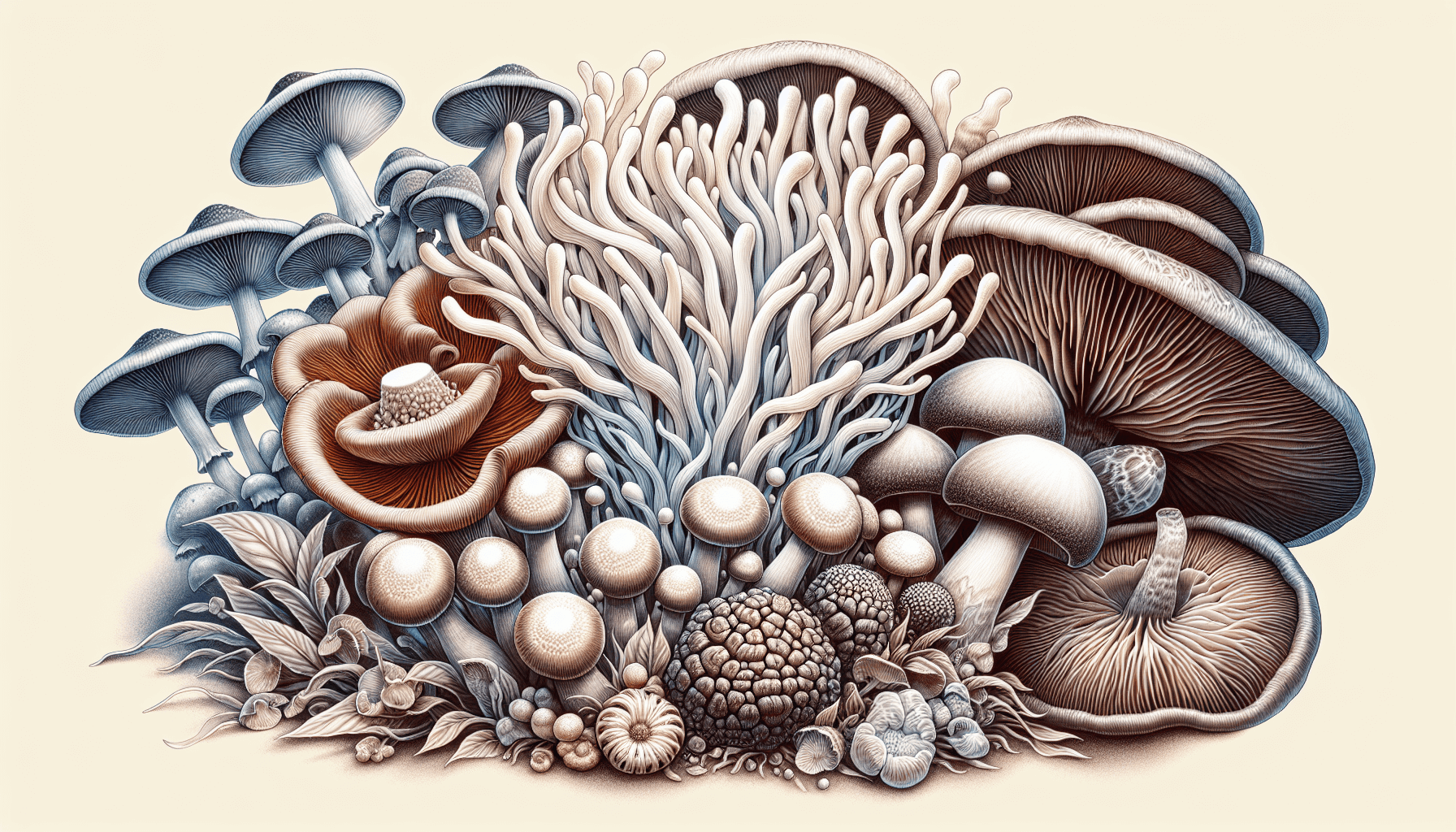* Only visible on admin mode.
Data Layer Value
Value
DataLayer - GTM_Page_Type
DataLayer - GTM_page_category
Front Row MD ID

Content
Author
Reviewed by
Date
Category
Tags
Unlocking the Mind: The Surprising Cognitive Benefits of Mushrooms
Immunity, Lifestyle, Longevity


June 15, 2024
Sydney E.
Are you curious about how mushrooms can improve your cognitive function? This article explores, with insights from scientific research, specific mushrooms known to boost memory, assist with learning, and improve overall brain performance.
Key Takeaways
Key Takeaways
- Lion’s Mane, Reishi, and Maitake mushrooms possess beneficial compounds for brain health. These compounds promote brain cell growth and enhance cognitive functions such as memory and learning.
- Incorporating these mushrooms into one’s diet can be accomplished through various means, such as consuming them raw or cooked, adding them to dishes, or taking them in supplement form while being mindful of potential side effects and allergies.
Introduction
Introduction
What if the key to unlocking the full potential of our cognitive abilities was hidden within nature’s most understated architects – mushrooms? This article will uncover how these bioactive compounds may enhance memory, learning, and cognitive abilities.
This isn’t just a tale of ancient folklore; it’s a story backed by scientific research that could reshape our understanding of maintaining and improving brain function.
The Role of Mushrooms in Brain Health
The Role of Mushrooms in Brain Health

Imagine your brain cells thriving, multiplying, and forming robust networks. This isn’t science fiction; it’s what certain mushrooms can potentially facilitatewithin our brains.
These natural wonders are not only a source of nutrients but also possess the astonishing ability to promote brain cell growth and overall brain health.
One such mushroom, the lion’s mane, has captured the attention of researchers for its ability to boost nerve growth and improve memory formation.
These therapeutic mushrooms, lion’s mane included, are not just edible but are becoming a cornerstone of health benefits beyond the gut. They enhance memory, boost the brain’s self-repair ability, and can play a pivotal role in improving memory.
Cultured brain cells have shown that the compounds in these fungi (mushrooms are types of fungi) can induce the growth of brain cells, suggesting a direct benefit to brain function.
Some of the key health benefits of lion’s mane mushrooms include:
- Enhancing memory
- Boosting brain function
- Supporting brain cell growth
- Improving cognitive function
- Protecting against neurodegenerative diseases
Key Mushrooms for Cognitive Function
Key Mushrooms for Cognitive Function

Some mushrooms are particularly noticeable within the broad fungi kingdom for their profound effects on cognitive function.
These include the Lion’s Mane, Reishi, and Maitake mushrooms, each contributing uniquely to brain health. Regularly incorporating these mushrooms into your diet could support brain cells and growth, especially as we age or recover from injury.
Lion's Mane Mushroom (Hericium erinaceus)
Lion's Mane Mushroom (Hericium erinaceus)
The Lion’s Mane mushroom, scientifically named Hericium erinaceus, is an edible and medicinal mushroom that has been stirring excitement for its cognitive benefits.
Compounds like hericenones and erinacines found in lion’s mane mushrooms are believed to stimulate the production of nerve growth factor (NGF), which plays a crucial role in the health and maintenance of neurons.
These active components significantly amplify the potential for enhanced memory formation and brain cell growth.
Remarkably, Lion’s Mane doesn’t just stop at enhancing memory. that it may also aid in the recovery from nervous system injuries, such as those to the spinal cord, and exhibit neuroprotective effects that can mitigate the impact of brain trauma.
Lion’s manerole in improving symptoms of mild cognitive impairment makes it a mushroom worth considering for those seeking to boost their memory and cognitive resilience.
Reishi Mushroom (Ganoderma lucidum)
Reishi Mushroom (Ganoderma lucidum)
Known as Ganoderma lucidum, the Reishi Mushroom is another medicinal mushroom that is celebrated for its anti-inflammatory properties.
Inflammation in the brain is a nefarious player in cognitive decline. Reishi’s ability to combat this positions it as a potential ally. Its role in traditional Chinese medicine is being revisited through the lens of modern science, revealing new insights into its health benefits.
Reishi mushrooms offer several health benefits, including:
- Bolstering brain health
- Modulating the immune response
Maitake Mushroom (Grifola frondosa)
Maitake Mushroom (Grifola frondosa)
Also known as the Maitake Mushroom, Grifola frondosa is affectionately known as the ‘dancing mushroom’ and is revered for its ability to support cognitive functions such as memory.
Rich in polysaccharides like beta-glucans, Maitake mushrooms enhance memory formation and contribute to overall brain health through their immune-boosting properties.
Identifying bioactive compounds in Maitake may reveal the power to stimulate crucial brain areas, including the hippocampus, which is central to learning and memory.
This mushroom’s neuroprotective properties and general health benefits make it an excellent addition to any diet aimed at cognitive enhancement.
How Bioactive Compounds Enhance Memory
How Bioactive Compounds Enhance Memory

Diving into the microscopic world of mushrooms reveals a plethora of bioactive compounds, such as hericenones and erinacines, which are believed to play a pivotal role in the growth of neurons and enhanced memory.
These active components, found in Lion’s Mane mushrooms, have been demonstrated to foster neuron projections, fostering new connections between nerve cells.
Super-resolution microscopy has allowed nerve growth researchers to visualize the impressive increase in size of nerve growth cones promoted by these active compounds.
These growth cones, whose active components largely increase, are critical for brain cells to explore their environment and establish vital connections essential for improved memory formation and cognitive function.
Laboratory Tests and Animal Studies
Laboratory Tests and Animal Studies
The mushrooms’ potential to boost brain and nerve health is not merely theoretical; it’s been substantiated by rigorous laboratory tests and animal studies.
Researchers have scientifically determined that the neurotrophic effects of compounds isolated from Lion’s Mane mushrooms can lead to the growth and development of brain and nerve cells, as confirmed through tests on cultured brain cells.
Lab and animal studies have been particularly revealing. They demonstrate that Lion’s Mane can reduce memory loss in mice and even prevent neuronal damage caused by amyloid-beta plaques.
These studies offer a glimpse into the molecular mechanism by which mushrooms might aid in conditions such as stroke and multiple sclerosis.
Potential Benefits for Alzheimer's Disease
Potential Benefits for Alzheimer's Disease

Traditional Medicine and Modern Research
Traditional Medicine and Modern Research
Traditional medicine practitioners have utilized the neuroprotective effects of mushrooms like Lion’s Mane for centuries.
These practices, especially prevalent in Asian countries, have long recognized the cognitive benefits of these fungi.
Today, collaborative efforts between traditional medicine and modern research are beginning to validate these ancient uses, revealing mushrooms' true medicinal properties.
While traditional Chinese medicine and Native American healing practices have always appreciated mushrooms' energy-boosting and neuroprotective qualities, modern science is now catching up.
The current research is promising, but to fully realize the full spectrum of health applications, more extensive human studies will be required.
How to Incorporate Mushrooms into Your Diet
How to Incorporate Mushrooms into Your Diet

Fortunately, these cognitive-boosting mushrooms can be seamlessly integrated into your diet in numerous ways.
Lion’s Mane mushrooms can be eaten raw, cooked, or taken as supplements. Their mild and sweet flavor makes them a versatile ingredient that can be added to dishes like omelets, soups, and stir-fries.
For those who prefer convenience, mushroom supplements in capsules, powders, or extracts can also be a practical option.
It’s important to choose supplements from reputable brands that ensure sustainable and organic sourcing. In addition, we recommend you start with a low dose to avoid potential side effects.
Possible Side Effects and Allergies
Possible Side Effects and Allergies
Even though Lion’s Mane mushrooms are typically safe for consumption, awareness of potential side effects and allergies is crucial.
Some people may experience gastrointestinal discomfort, skin rashes, or serious allergic reactions like hives and swelling.
It is important to consult a healthcare provider before introducing new supplements into your routine, especially if you have a history of asthma or allergies.
Should you experience any adverse symptoms after consuming Lion’s Mane mushrooms, seek prompt medical attention. This caution ensures that you can enjoy the health benefits of mushrooms while minimizing the risk of unpleasant reactions.
Summary
Summary
As we conclude this article, it’s clear that mushrooms hold a treasure trove of cognitive benefits that are just beginning to be understood.
The key takeaway is that incorporating mushrooms, such as Lion’s Mane, Reishi, and Maitake, into your diets could be a simple yet effective strategy for cognitive enhancement.
With the backing of both traditional wisdom and modern science, mushrooms stand poised to significantly impact our collective brain health.
Frequently Asked Questions
Do mushrooms help your brain?
Do mushrooms help your brain?
Are there any risks associated with consuming Lion's Mane mushrooms?
Are there any risks associated with consuming Lion's Mane mushrooms?
How can I add mushrooms to my diet for cognitive benefits?
How can I add mushrooms to my diet for cognitive benefits?
You can add mushrooms to your diet by including them in stir-fries, soups, or smoothies, which provide cognitive benefits. Incorporating mushrooms in various forms, such as raw, cooked, or as supplements, is also beneficial for cognitive health.
How does traditional medicine view the use of mushrooms for brain health?
How does traditional medicine view the use of mushrooms for brain health?
Traditional medicine views the use of mushrooms for brain health favorably, as they have been used in practices like traditional Chinese medicine for their neuroprotective effects for centuries. Nowadays, modern research is starting to confirm these traditional benefits .


-
Latest Posts
-
-
The Power of Fiber: Why Your Body Loves It and How to Get More
-
Know Your Oats: A Comprehensive Guide
-
5 Steps to a Healthier You
-
Advancing Health with GLP-1: Innovations, Applications, and Future Directions
-
Understanding and Managing Urinary Tract Infections (UTIs): Prevention, Treatment, and Complications
-
-
Contacts
Contacts
967 E. Parkcenter Blvd #345
Boise, ID 83706
7 A.M. - 3 P.M. MST, Mon - Fri
(833) 332-8655
support@clinicaleffects.com
THE STATEMENTS MADE ON OUR WEBSITES HAVE NOT BEEN EVALUATED BY THE FDA (U.S. FOOD & DRUG ADMINISTRATION). OUR PRODUCTS ARE NOT INTENDED TO DIAGNOSE, CURE OR PREVENT ANY DISEASE. CLINICAL EFFECTS IS NOT AFFILIATED WITH ANY OF THE STUDIES MENTIONED ON THE WEBSITE. THE TESTIMONIALS ON THIS WEBSITE ARE INDIVIDUAL CASES AND DO NOT GUARANTEE THAT YOU WILL GET THE SAME RESULTS.
© All Rights Reserved 2021








